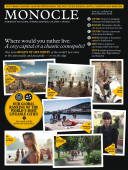
Issue 35
Our 2010 Quality of Life Survey of the world’s best cities to live punctually and peacefully in – or on the edge.
In This Issue
Oops! No content was found.
Looks like we no longer have content for the page you're on. Perhaps try a search?
Return Home

